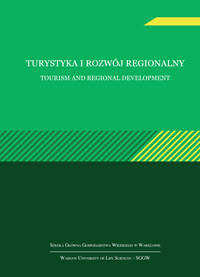Main Article Content
Article Details
Baker, Z. G., Krieger, H., LeRoy, A. S. (2016). Fear of missing out: Relationships with depression, mindfulness, and physical symptoms. Translational Issues in Psychological Science, 2 (3), p. 275. (Crossref)
Bec, A., Moyle, B., Schaffer, V., Timms, K. (2021). Virtual reality and mixed reality for second Chance tourism. Tourism Management, 83 (2), 104256. (Crossref)
Dickinson, E., Hibbert, J. F. (2016). Viachaslau Filimonau, Mobile technology and the tourist experience: (Dis)connection at the campsite. Tourism Management, 57, p. 193–201. (Crossref)
Dieck, T. D., Dieck, M. C. T, Jung, T., Moorhouse, N. (2018). Tourists’ virtual reality adoption: An exploratory study from lake district national park. Leisure Studies, 37 (4), p. 371–383. (Crossref)
Edelman, M. (2018). 8 Trends Shaping Travel. Available at: https://www.edelman.com/post/trendsshapingtravel-tourism-2018 (access: 02.05.2023).
Friman, M., Gärling, T., Ettema, D., Olsson, L. E. (2017). How does travel affect emotional wellbeing and life satisfaction? Transportation research part A: policy and practice, 106, p. 170–180. (Crossref)
Fusté-Forné, F., Hussain, A. (2021). Looking through a tourist gaze: the Joy of Missing Out (JOMO) and the case of mussels. Journal of Tourism, Hospitality and Culinary Arts, 13 (2), p. 1–8.
Geng, W. (2023). Whether and how free virtual tours can bring back visitors. Current Issues in Tourism, 26 (5), p. 823–834. (Crossref)
Hayran, C., Anik, L. (2021). Well-Being and Fear of Missing Out (FOMO) on Digital Content in the Time of COVID-19: A Correlational Analysis among University Students. International Journal of Environmental Research and Public Health, 18 (4), p. 1974. DOI: https://doi.org/10.3390/ijerph18041974 (Crossref)
Herman, D. (2010). The Fear of Missing Out (FOMO). Available at: http://www.danherman.com/The-Fear-of-Missing-Out-(FOMO)-by-Dan-Herman.html (access: 13.06.2022).
Hodkinson, C. (2019). Fear of Missing Out (FOMO) marketing appeals: A conceptual model. Journal of Marketing Communications, 25 (1), p. 65–88. (Crossref)
Hussain, A. (2021). A future of tourism industry: Conscious travel, destination recovery and regenerative tourism. Journal of Sustainability and Resilience, 1, p. 1–10.
Jupowicz-Ginalska, A. (2021). Raport FOMO. Polacy a lęk przed odłączeniem podczas pandemii (FOMO Report 2021. The Polish population vs. the fear of going offline during the pandemic). Warsaw.
Kang, I., Cui, H., Son, J. (2019). Conformity consumption behavior and FOMO. Sustainability, 11 (17), p. 4734. (Crossref)
Liu, L.-W., Wang, C.-C., Pahrudin., P., Royanow, A. F., Lu, C., Rahadi, I. (2023). Does virtual tourism influence tourist visit intention on actual attraction? A study from tourist behavior in Indonesia. Cogent Social Sciences 9(1). DOI: https://doi.org/10.1080/23311886.2023.2240052 (Crossref)
Lu, J., Xiao, X., Xu, Z., Wang, C., Zhang, M., Zhou, Y. (2022). The potential of virtual tourism in the recovery of tourism industry during the COVID-19 pandemic. Current Issues in Tourism, 25 (3), p. 441–457. DOI: https://doi.org/10.1080/13683500.2021.1959526 (Crossref)
Putra, F. K. K. (2019). Emerging Travel Trends: Joy of Missing Out (JOMO) Vs Iconic Landmarks. Jurnal Pariwisata Terapan, 3 (1), p. 28–41. (Crossref)
Przybylski, A. K., Murayama, K., DeHaan, C. R., Gladwell, V. (2013). Motivational, emotional, and behavioral correlates of fear of missing out. Computers in Human Behavior, 29 (4), p. 1841–1848. (Crossref)
Taylor, D. G. (2018). Social media usage, FOMO, and conspicuous consumption: An exploratory study: An abstract. In Academy of Marketing Science World Marketing Congress Springer, Cham, p. 857–858. (Crossref)
Wojcieszak-Zbierska, M. (2021). General trends and their potential impact on the development of tourism and leisure activities in Poland. [In:] Tourism and socio-economic transformation of rural. London: Routledge, p. 291–361. (Crossref)
Zhang, S.-N., Li, Y.-Q., Ruan, W.-Q., Liu, C.-H. (2022). Would you enjoy virtual travel? The characteristics and causes of virtual tourists’ sentiment under the influence of the COVID-19 pandemic. Tourism Management, 88, 104429. (Crossref)
Downloads
- Arkadiusz Niedziółka, Andrzej Krasnodębski, Podejście sieciowe w agroturystyce w obszarze marketingu i zarządzania strategicznego , Turystyka i Rozwój Regionalny: Nr 20 (2023)
Możesz również Rozpocznij zaawansowane wyszukiwanie podobieństw dla tego artykułu.
- Monika Wojcieszak-Zbierska, Krótkie łańcuchy dostaw szansą dla lokalnych przedsiębiorców rolnych , Turystyka i Rozwój Regionalny: Nr 15 (2021)
- Michał Roman, Norbert Kawęcki, Iryna Kudinova, Arkadiusz Niedziółka, Ewa Szczucka, Monika Wojcieszak-Zbierska, Agritourism farms as places of providing therapeutic services for people with autism spectrum disorder , Turystyka i Rozwój Regionalny: Nr 22 (2024)
- Monika Wojcieszak-Zbierska, Jan Zawadka, Działania przedsiębiorcze kobiet na wsi na przykładzie KGW w powiecie gnieźnieńskim , Turystyka i Rozwój Regionalny: Nr 11 (2019)
- Monika Wojcieszak-Zbierska, Rola ogrodów społecznych w kształtowaniu relacji społecznych , Turystyka i Rozwój Regionalny: Nr 22 (2024)
- Monika Wojcieszak-Zbierska, Koszty działań marketingowych gospodarstw agroturystycznych i możliwości ich finansowania , Turystyka i Rozwój Regionalny: Nr 12 (2019)
- Monika Wojcieszak-Zbierska, Rural women’s health: examples of programs designed to support the health aspect of female rural population , Turystyka i Rozwój Regionalny: Nr 19 (2023)

Utwór dostępny jest na licencji Creative Commons Uznanie autorstwa – Użycie niekomercyjne 4.0 Międzynarodowe.





